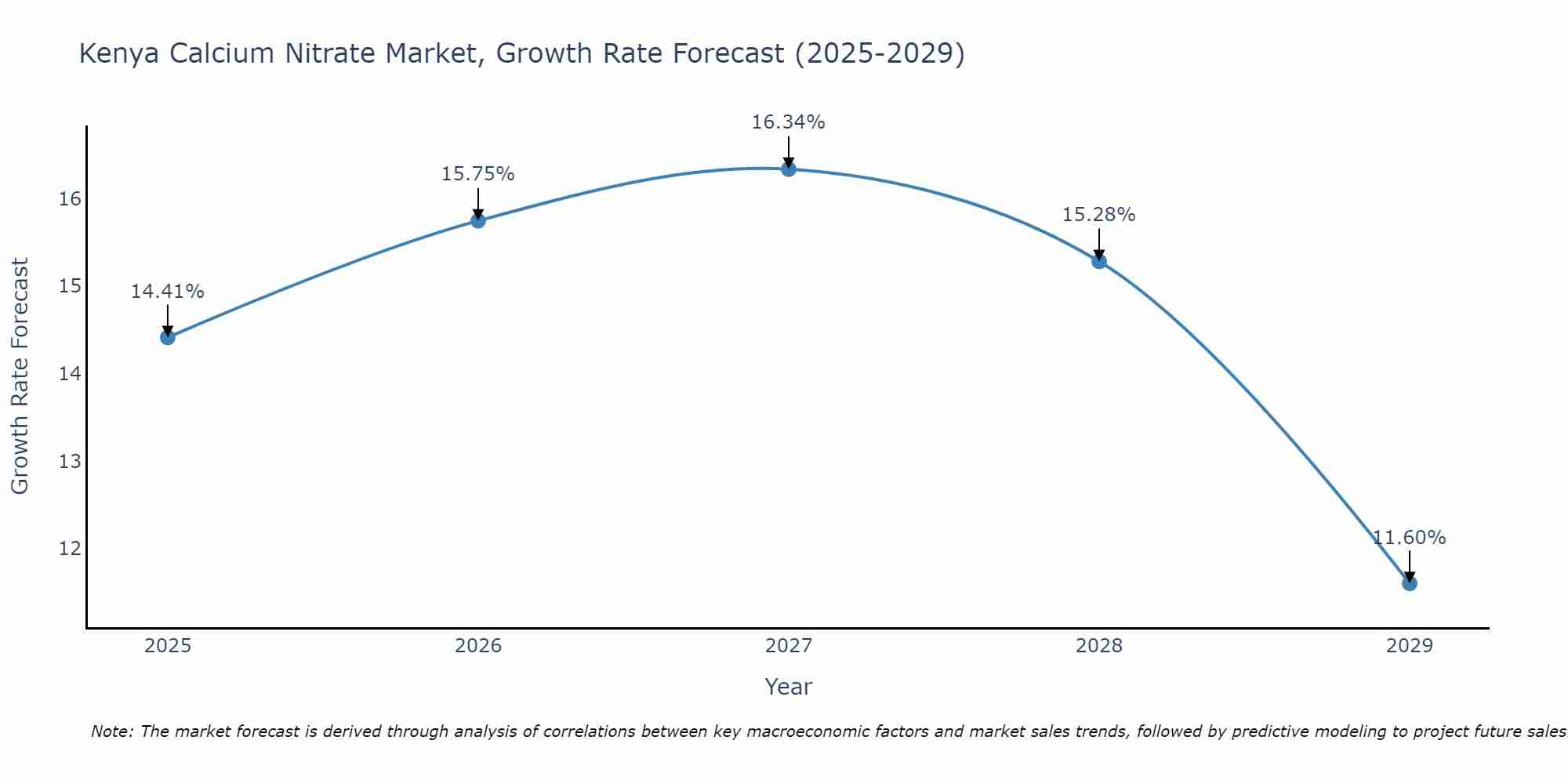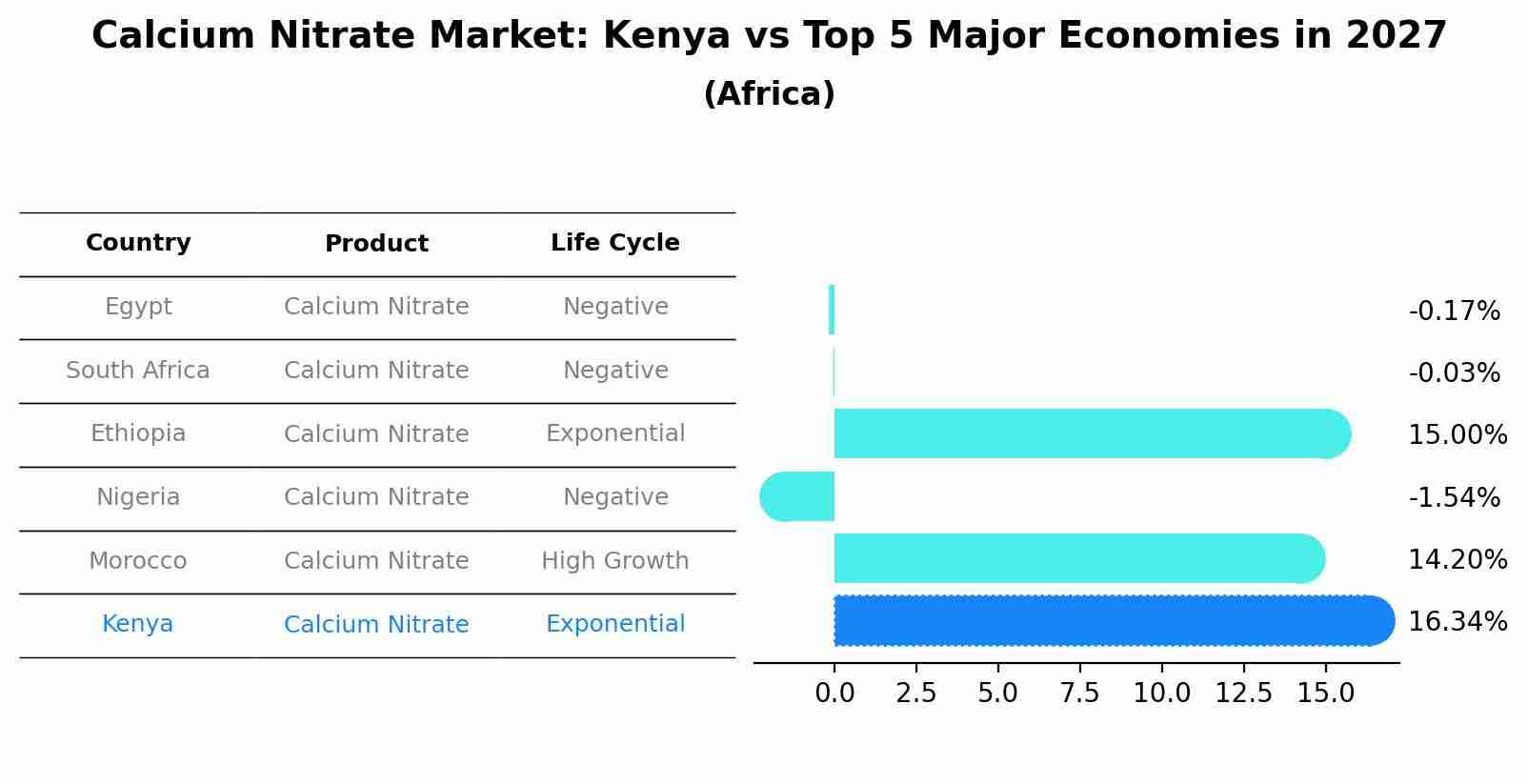Kenya Calcium Nitrate Market Outlook | Share, Forecast, Trends, Companies, Size, Analysis, Revenue, Industry, Growth, Value & COVID-19 IMPACT
| Product Code: ETC093489 | Publication Date: Jun 2021 | Updated Date: Apr 2025 | Product Type: Report | |
| Publisher: 6Wresearch | Author: Ravi Bhandari | No. of Pages: 70 | No. of Figures: 35 | No. of Tables: 5 |
Kenya Calcium Nitrate Market Size Growth Rate
The Kenya Calcium Nitrate Market is projected to witness mixed growth rate patterns during 2025 to 2029. The growth rate begins at 14.41% in 2025, climbs to a high of 16.34% in 2027, and moderates to 11.60% by 2029.

Calcium Nitrate Market: Kenya vs Top 5 Major Economies in 2027 (Africa)
By 2027, Kenya's Calcium Nitrate market is forecasted to achieve a exponential growth rate of 16.34%, with Egypt leading the Africa region, followed by South Africa, Ethiopia, Nigeria and Morocco.

Kenya Calcium Nitrate Market Overview
In Kenya, the calcium nitrate market is experiencing steady growth, primarily driven by its applications in agriculture. Calcium nitrate serves as a valuable source of calcium and nitrogen for plants, aiding in their growth and development. With the government`s focus on enhancing agricultural productivity and promoting modern farming practices, demand for calcium nitrate as a fertilizer is increasing. Additionally, efforts to improve soil fertility and crop yields further bolster the market`s prospects, making it an essential component of Kenya agricultural landscape.
Drivers of the market
The Kenya Calcium Nitrate market is primarily driven by the increasing demand for fertilizers in the agricultural sector. Calcium nitrate is extensively used as a fertilizer due to its high solubility and effectiveness in providing essential nutrients like calcium and nitrogen to plants. The growing population and the need to enhance agricultural productivity are further fueling the demand for calcium nitrate in Kenya. Additionally, government initiatives to promote modern farming techniques and the adoption of advanced fertilizers are expected to boost market growth.
Challenges of the market
The calcium nitrate market in Kenya encounters challenges such as high production costs and competition from other fertilizers. Producing calcium nitrate involves advanced technology and high-quality raw materials, leading to significant costs. Additionally, the market faces competition from other nitrogen-based fertilizers, which can offer similar benefits at lower costs.
Government Policy of the market
Recognizing the importance of calcium nitrate in agriculture and soil fertility management, the Kenya government has implemented policies to support the calcium nitrate market. These policies include agricultural subsidies for calcium nitrate fertilizers, research funding for soil nutrient management, and extension services to promote balanced fertilization practices for sustainable crop production and food security.
Key Highlights of the Report:
- Kenya Calcium Nitrate Market Outlook
- Market Size of Kenya Calcium Nitrate Market, 2020
- Forecast of Kenya Calcium Nitrate Market, 2027
- Historical Data and Forecast of Kenya Calcium Nitrate Revenues & Volume for the Period 2018 - 2027
- Kenya Calcium Nitrate Market Trend Evolution
- Kenya Calcium Nitrate Market Drivers and Challenges
- Kenya Calcium Nitrate Price Trends
- Kenya Calcium Nitrate Porter's Five Forces
- Kenya Calcium Nitrate Industry Life Cycle
- Historical Data and Forecast of Kenya Calcium Nitrate Market Revenues & Volume By Grade for the Period 2018 - 2027
- Historical Data and Forecast of Kenya Calcium Nitrate Market Revenues & Volume By Agriculture for the Period 2018 - 2027
- Historical Data and Forecast of Kenya Calcium Nitrate Market Revenues & Volume By Greenhouse for the Period 2018 - 2027
- Historical Data and Forecast of Kenya Calcium Nitrate Market Revenues & Volume By Fertigation for the Period 2018 - 2027
- Historical Data and Forecast of Kenya Calcium Nitrate Market Revenues & Volume By Liquid for the Period 2018 - 2027
- Historical Data and Forecast of Kenya Calcium Nitrate Market Revenues & Volume By Application for the Period 2018 - 2027
- Historical Data and Forecast of Kenya Calcium Nitrate Market Revenues & Volume By Fertilizers for the Period 2018 - 2027
- Historical Data and Forecast of Kenya Calcium Nitrate Market Revenues & Volume By Wastewater Treatment Chemicals for the Period 2018 - 2027
- Historical Data and Forecast of Kenya Calcium Nitrate Market Revenues & Volume By Concrete Manufacturing for the Period 2018 - 2027
- Historical Data and Forecast of Kenya Calcium Nitrate Market Revenues & Volume By Explosives for the Period 2018 - 2027
- Kenya Calcium Nitrate Import Export Trade Statistics
- Market Opportunity Assessment By Grade
- Market Opportunity Assessment By Application
- Kenya Calcium Nitrate Top Companies Market Share
- Kenya Calcium Nitrate Competitive Benchmarking By Technical and Operational Parameters
- Kenya Calcium Nitrate Company Profiles
- Kenya Calcium Nitrate Key Strategic Recommendations
Frequently Asked Questions About the Market Study (FAQs):
- Single User License$ 1,995
- Department License$ 2,400
- Site License$ 3,120
- Global License$ 3,795
Search
Thought Leadership and Analyst Meet
Our Clients
Related Reports
- Canada Oil and Gas Market (2026-2032) | Share, Segmentation, Value, Industry, Trends, Forecast, Analysis, Size & Revenue, Growth, Competitive Landscape, Outlook, Companies
- Germany Breakfast Food Market (2026-2032) | Industry, Share, Growth, Size, Companies, Value, Analysis, Revenue, Trends, Forecast & Outlook
- Australia Briquette Market (2025-2031) | Growth, Size, Revenue, Forecast, Analysis, Trends, Value, Share, Industry & Companies
- Vietnam System Integrator Market (2025-2031) | Size, Companies, Analysis, Industry, Value, Forecast, Growth, Trends, Revenue & Share
- ASEAN and Thailand Brain Health Supplements Market (2025-2031) | Strategy, Consumer Insights, Analysis, Investment Trends, Opportunities, Growth, Size, Share, Industry, Revenue, Segments, Value, Segmentation, Supply, Forecast, Restraints, Outlook, Competition, Drivers, Trends, Demand, Pricing Analysis, Competitive, Strategic Insights, Companies, Challenges
- ASEAN Bearings Market (2025-2031) | Strategy, Consumer Insights, Analysis, Investment Trends, Opportunities, Growth, Size, Share, Industry, Revenue, Segments, Value, Segmentation, Supply, Forecast, Restraints, Outlook, Competition, Drivers, Trends, Demand, Pricing Analysis, Competitive, Strategic Insights, Companies, Challenges
- Europe Flooring Market (2025-2031) | Outlook, Share, Industry, Trends, Forecast, Companies, Revenue, Size, Analysis, Growth & Value
- Saudi Arabia Manlift Market (2025-2031) | Outlook, Size, Growth, Trends, Companies, Industry, Revenue, Value, Share, Forecast & Analysis
- Uganda Excavator, Crane, and Wheel Loaders Market (2025-2031) | Strategy, Consumer Insights, Analysis, Investment Trends, Opportunities, Growth, Size, Share, Industry, Revenue, Segments, Value, Segmentation, Supply, Forecast, Restraints, Outlook, Competition, Drivers, Trends, Demand, Pricing Analysis, Competitive, Strategic Insights, Companies, Challenges
- Rwanda Excavator, Crane, and Wheel Loaders Market (2025-2031) | Strategy, Consumer Insights, Analysis, Investment Trends, Opportunities, Growth, Size, Share, Industry, Revenue, Segments, Value, Segmentation, Supply, Forecast, Restraints, Outlook, Competition, Drivers, Trends, Demand, Pricing Analysis, Competitive, Strategic Insights, Companies, Challenges
Industry Events and Analyst Meet
Whitepaper
- Middle East & Africa Commercial Security Market Click here to view more.
- Middle East & Africa Fire Safety Systems & Equipment Market Click here to view more.
- GCC Drone Market Click here to view more.
- Middle East Lighting Fixture Market Click here to view more.
- GCC Physical & Perimeter Security Market Click here to view more.
6WResearch In News
- Doha a strategic location for EV manufacturing hub: IPA Qatar
- Demand for luxury TVs surging in the GCC, says Samsung
- Empowering Growth: The Thriving Journey of Bangladesh’s Cable Industry
- Demand for luxury TVs surging in the GCC, says Samsung
- Video call with a traditional healer? Once unthinkable, it’s now common in South Africa
- Intelligent Buildings To Smooth GCC’s Path To Net Zero


















